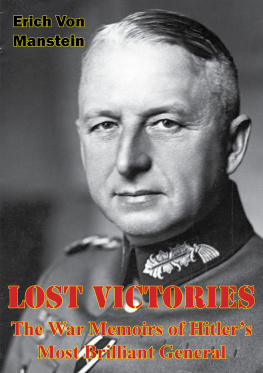Manstein - Lost Victories
Here you can read online Manstein - Lost Victories full text of the book (entire story) in english for free. Download pdf and epub, get meaning, cover and reviews about this ebook. year: 2016, publisher: Pickle Partners Publishing, genre: Non-fiction. Description of the work, (preface) as well as reviews are available. Best literature library LitArk.com created for fans of good reading and offers a wide selection of genres:
Romance novel
Science fiction
Adventure
Detective
Science
History
Home and family
Prose
Art
Politics
Computer
Non-fiction
Religion
Business
Children
Humor
Choose a favorite category and find really read worthwhile books. Enjoy immersion in the world of imagination, feel the emotions of the characters or learn something new for yourself, make an fascinating discovery.
- Book:Lost Victories
- Author:
- Publisher:Pickle Partners Publishing
- Genre:
- Year:2016
- Rating:4 / 5
- Favourites:Add to favourites
- Your mark:
- 80
- 1
- 2
- 3
- 4
- 5
Lost Victories: summary, description and annotation
We offer to read an annotation, description, summary or preface (depends on what the author of the book "Lost Victories" wrote himself). If you haven't found the necessary information about the book — write in the comments, we will try to find it.
Lost Victories — read online for free the complete book (whole text) full work
Below is the text of the book, divided by pages. System saving the place of the last page read, allows you to conveniently read the book "Lost Victories" online for free, without having to search again every time where you left off. Put a bookmark, and you can go to the page where you finished reading at any time.
Font size:
Interval:
Bookmark:


This edition is published by PICKLE PARTNERS PUBLISHINGwww.picklepartnerspublishing.com
To join our mailing list for new titles or for issues with our books picklepublishing@gmail.com
Or on Facebook
Text originally published in 1958 under the same title.
Pickle Partners Publishing 2014, all rights reserved. No part of this publication may be reproduced, stored in a retrieval system or transmitted by any means, electrical, mechanical or otherwise without the written permission of the copyright holder.
Publishers Note
Although in most cases we have retained the Authors original spelling and grammar to authentically reproduce the work of the Author and the original intent of such material, some additional notes and clarifications have been added for the modern readers benefit.
We have also made every effort to include all maps and illustrations of the original edition the limitations of formatting do not allow of including larger maps, we will upload as many of these maps as possible.
LOST VICTORIES
BY
FIELD-MARSHAL ERICH VON MANSTEIN
Edited and translated by
ANTHONY G. POWELL
Foreword by
CAPTAIN B. H. LIDDELL HART
Contents
DEM ANDENKEN UNSERES GEFALLEN SOHNES GERO v. MANSTEIN UND ALLER FR DEUTSCHLAND GEFALLENEN KAMARADEN
Key to Symbols used in Maps
1. German and Polish Deployment, and Execution of German Offensive.
2. Southern Army Groups Operations in Polish Campaign.
3. The O.K.H. plan of Operations for German Offensive in the West.
4. Army Group As Proposals for German Operations in the West.
5. 38 Corps Advance from the Somme to the Loire.
6. 56 Panzer Corps Drive into Russia.
7. Situation of Northern Army Group on 26th June 1941 after 56 Panzer Corps Capture of Dvinsk.
8. Encirclement of 56 Panzer Corps at Zoltsy (15th-18th July 1941).
9. 56 Panzer Corps Drive into Flank of Thirty-Eighth Soviet Army on 19th August 1941.
10. Battle on the Sea of Azov and Breakthrough at the Isthmus of Perekop (Autumn 1941).
11. Breakthrough at Ishun and Conquest of the Crimea (Autumn 1941).
12. Re-Conquest of the Kerch Peninsula (May 1942).
13. Conquest of Sevastopol (June-July 1942).
14. Battle of Lake Ladoga (September 1942).
15. Situation on German Southern Wing at end of November 1942: the Struggle to free Sixth Army.
16. Winter Campaign 1942-3: Don Army Groups Struggle to keep Army Group As rear free.
17. Winter Campaign 1942-3: Don Army Groups Battles to keep Communications Zone free.
18. Winter Campaign 1942-3: German Counterstroke, the Battle between Donetz and Dnieper.
19. Winter Campaign 1942-3: German Counterstroke, the Battle of Kharkov.
20. Operation Citadel (July 1943).
21. Battles Fought by Southern Army Group 17th July-30th September 1943.
22. The Fight for the Dnieper Bend.
23. Battles Fought by Southern Army Group up to mid-February 1944.
24. Developments on Southern Wing of Eastern Front at end of March 1944.
The Author, 1944
With members of the German minority in Siebenbrgen, accompanied by his son, Gero, and Lt. Specht
At H.Q. 50 Division in the Crimea
With Col.-Gen. Dumitrescu
Southern coastline in the Crimea
Maxim Gorki I
Sevastopol on fire
Russian Battery at entrance to Severnaya Bay
Crimean meeting with Marshal Antonescu
With Baron v. Richthofen at Kerch, May 1942
Caravan conference before Leningrad
Conference with Gen. Kempf and Gen. Busse, during Citadel
H.Q. at Vinnitsa
THE general verdict among the German generals I interrogated in 1945 was that Field Marshal von Manstein had proved the ablest commander in their Army, and the man they had most desired to become its Commander-in-Chief. It is very clear that he had a superb sense of operational possibilities and an equal mastery in the conduct of operations, together with a greater grasp of the potentialities of mechanised forces than any of the other commanders who had not been trained in the tank arm. In sum, he had military genius.
In the earlier stages of the war he exerted a great influence behind the scenes as a staff officer. Later he became an outstanding commander, and played a key part from 1941 to 1944 in the titanic struggle on the Russian front. His detailed account of the campaigns, pungent comments, and very significant revelations combine to make his book one of the most important and illuminating contributions to the history of World War II.
An extraordinary aspect of Erich von Mansteins career is that he is best known, outside Germany at any rate, in connexion with operations that took place when he was a relatively junior general, and in which he took no part. For his fame primarily arose from his influence on the design or, rather, on the recasting of the plan for the German offensive of 1940 which broke through the Western Front, and led to the fall of France, with all its far-reaching results. The new plan, for making the decisive thrust through the hilly and wooded Ardennes the line of least expectation has come to be called the Manstein Plan. That is tribute to what he did in evolving it and striving to win acceptance for it in place of the old plan, for a more direct attack through Belgium which would in all probability have resulted in a repulse.
At that time Manstein was Chief of Staff to Rundstedts Army Group, and when his arguments for changing the plan became irritating to his superiors he was honourably pushed out of the way by promotion to command a reserve corps, of infantry, just before the new plan was adopted under Hitlers pressure after hearing Mansteins arguments. The book provides much fresh information on the course of this operational controversy and the evolution of the plan that led to victory.
In the crucial opening stage of the offensive, which cut off the Allies left wing and trapped it on the Channel coast, Mansteins corps merely had a follow-on part. But in the second and final stage it played a bigger role. Under his dynamic leadership, his infantry pushed on so fast on foot that they raced the armoured corps in the drive southward across the Somme and the Seine to the Loire.
After the collapse of France, Hitler hoped that Britain would make peace, but when disappointed he began, belatedly and half-heartedly, to make preparations for a cross-Channel invasion. Manstein was entrusted with the task of leading the initial landing with his corps, which was moved to the Boulogne-Calais area for the purpose. His book has some striking comments on the problem, on the strategic alternatives, and on Hitlers turn away to deal with Russia.
For the invasion of Russia in 1941 Manstein was given his hearts desire the command of an armoured corps, the 56th. With it he made one of the quickest and deepest thrusts of the opening stage, from East Prussia to the Dvina, nearly 200 miles, within four days. Promoted to command the Eleventh Army in the south, he forced an entry into the Crimean peninsula by breaking through the fortified Perekop Isthmus, and in the summer of 1942 further proved his mastery of siege-warfare technique by capturing the famous fortress of Sevastopol, the key centre of the Crimeabeing Russias main naval base on the Black Sea.
He was then sent north again to command the intended attack on Leningrad, but called away by an emergency summons to conduct the efforts to relieve Pauluss Sixth Army, trapped that winter at Stalingrad, after the failure of the main German offensive of 1942. The effort failed because Hitler, forbidding any withdrawal, refused to agree to Mansteins insistence that Paulus should be told to break out westward and meet the relieving forces. The long chapter on The Tragedy of Stalingrad is full of striking revelations, and the more illuminating because of the penetrating analysis of Hitler as Supreme Commander in the preceding chapter.
Next pageFont size:
Interval:
Bookmark:
Similar books «Lost Victories»
Look at similar books to Lost Victories. We have selected literature similar in name and meaning in the hope of providing readers with more options to find new, interesting, not yet read works.
Discussion, reviews of the book Lost Victories and just readers' own opinions. Leave your comments, write what you think about the work, its meaning or the main characters. Specify what exactly you liked and what you didn't like, and why you think so.









